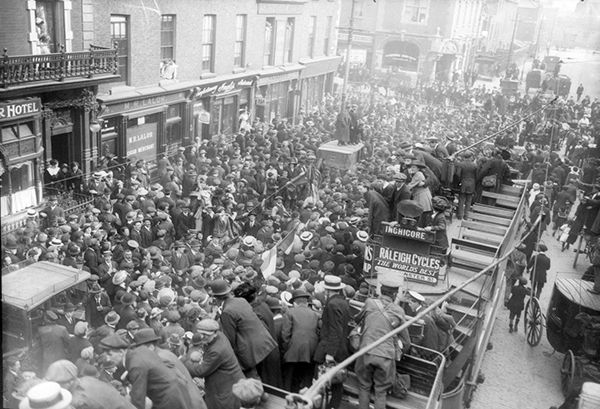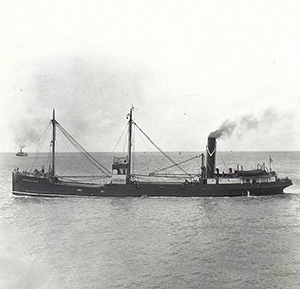COUNTDOWN TO 2016: Release of prisoners, Christmas 1916
Published in Issue 6 (November/December 2016), Reviews, Volume 24By Joseph E.A. Connell Jr
The Rising had hardly been the work of a massive conspiracy, but the British acted as if it were. British security forces arrested 3,430 Irish men and 79 women, of whom 1,841 were sent to Britain and interned there. These were substantial figures in relation to the scale of the outbreak, though most (about 2,700) had been released by early August 1916. Meanwhile, those thought to have organised the insurrection had been held back in Ireland for trial. These mass arrests and the increased military presence portrayed Ireland as a country in the control of an oppressive and alien government that could only rule by force.
Since the Rising, MPs had questioned whether the mass internments were effective or were counter-productive. That the British government wanted to release the prisoners by the end of 1916 is clear from the Members’ Questions of the time as recorded in Hansard. In addition to showing the great wit and argument of those sessions, the fact that many MPs felt that prisoner releases were long overdue is clear.

Above: Crowds at Westland Row railway station, Dublin, welcoming home released internees, Christmas 1916. (NLI)
Mr Byrne: asked the Home Secretary if any new conditions have been agreed on as regards the treatment of the Irish prisoners of war; if they have been now eight months imprisoned; whether he proposes to release them at an early date; and, if so, when?
Sir G. Cave: I am not in a position to add anything to the answers given by my predecessor and by the Chief Secretary for Ireland on this subject.
Mr Byrne: Having regard to the fact that the blundering and stupidity of his predecessor in the past have been the means of the right hon. Gentleman occupying his present position, will he not say whether the blundering and stupidity will now cease?
Mr Speaker: I should like to see that question on the Paper.
Mr Byrne: Does not the right hon. Gentleman think that the time has come for the release of all prisoners?
Mr Byrne: asked the Home Secretary if his attention has been drawn to the admissions of Sergeant-Major Newstead, when under cross-examination at the court-martial of the fifteen Irish prisoners at Frongoch; if Sergeant-Major Newstead admitted that the commandant stated that he would have discipline if he had nothing but dead bodies in the camp; if these statements are deeply resented in Ireland and are likely to cause further trouble in the camp; and whether the commandant has yet been proved to be perfectly sane by a doctor?
Sir G. Cave: The answer I shall give to the hon. Gentleman opposite (Mr Byrne) I think answers that question. I have asked to see the evidence taken by the Military Court, and am making special inquiries as to the conditions at Frongoch …
Mr Ginnell: asked the Secretary of State for the Home Department whether he has yet come to a decision with reference to release or amelioration of the condition of all or any of the 500 untried Irish prisoners now being starved at Frongoch; and especially whether the 350 of them now in special punishment in the insanitary [sic] south camp, and denied visits, letters, and comforts sent to them by friends, will be returned to the north camp for Christmas, and allowed to receive parcels from friends outside?
Sir G. Cave: It is not true that anyone has been starved, and the reply I have given the hon. Gentleman will cover the remainder of the question.
Mr Lynch: Can there not be a general amnesty of these prisoners, and could not that have been undertaken months ago?
By the end of 1916 the British authorities had determined to release most of the rebels, and these were home in Ireland by Christmas. They returned to a riotous welcome, a complete turn-around from the send-off they had been given by the populace eight months earlier on the way to prison. The tide of public opinion had clearly changed.
Joseph E.A. Connell Jr is the author of Who’s who in the Dublin Rising (Wordwell Books). His new book, Michael Collins’s Dublin, will be published in early 2017 (also by Wordwell).
This column will continue until the end of 2024 under the title ‘100 YEARS AGO’.


















